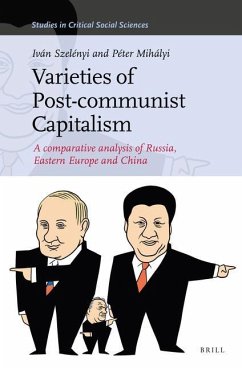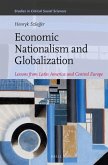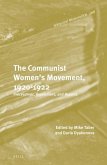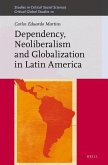Iván Szelényi, Péter Mihályi
Varieties of Post-Communist Capitalism
A Comparative Analysis of Russia, Eastern Europe and China
Iván Szelényi, Péter Mihályi
Varieties of Post-Communist Capitalism
A Comparative Analysis of Russia, Eastern Europe and China
- Gebundenes Buch
- Merkliste
- Auf die Merkliste
- Bewerten Bewerten
- Teilen
- Produkt teilen
- Produkterinnerung
- Produkterinnerung
This book intends to be a contribution to the varieties of capitalism paradigm. Our main question is to what extent the present system in Russia, the model of President Putin is a generic model for all post-communist capitalisms.
Andere Kunden interessierten sich auch für
![Fundamental Problems of the Sociology of Thinking Fundamental Problems of the Sociology of Thinking]() Konstantin MegrelidzeFundamental Problems of the Sociology of Thinking209,99 €
Konstantin MegrelidzeFundamental Problems of the Sociology of Thinking209,99 €![Economic Nationalism and Globalization Economic Nationalism and Globalization]() Henryk SzlajferEconomic Nationalism and Globalization237,99 €
Henryk SzlajferEconomic Nationalism and Globalization237,99 €![Contradictions of Capitalist Society and Culture Contradictions of Capitalist Society and Culture]() Raju J DasContradictions of Capitalist Society and Culture174,99 €
Raju J DasContradictions of Capitalist Society and Culture174,99 €![From Online Platforms to Digital Monopolies From Online Platforms to Digital Monopolies]() Jonas C L ValenteFrom Online Platforms to Digital Monopolies315,99 €
Jonas C L ValenteFrom Online Platforms to Digital Monopolies315,99 €![Islam in Post-Communist Eastern Europe Islam in Post-Communist Eastern Europe]() Ra &Islam in Post-Communist Eastern Europe146,99 €
Ra &Islam in Post-Communist Eastern Europe146,99 €![The Communist Women's Movement, 1920-1922 The Communist Women's Movement, 1920-1922]() The Communist Women's Movement, 1920-1922256,99 €
The Communist Women's Movement, 1920-1922256,99 €![Dependency, Neoliberalism and Globalization in Latin America Dependency, Neoliberalism and Globalization in Latin America]() Carlos Eduardo MartinsDependency, Neoliberalism and Globalization in Latin America261,99 €
Carlos Eduardo MartinsDependency, Neoliberalism and Globalization in Latin America261,99 €-
-
-
This book intends to be a contribution to the varieties of capitalism paradigm. Our main question is to what extent the present system in Russia, the model of President Putin is a generic model for all post-communist capitalisms.
Hinweis: Dieser Artikel kann nur an eine deutsche Lieferadresse ausgeliefert werden.
Hinweis: Dieser Artikel kann nur an eine deutsche Lieferadresse ausgeliefert werden.
Produktdetails
- Produktdetails
- Verlag: Brill
- Seitenzahl: 264
- Erscheinungstermin: 28. November 2019
- Englisch
- Abmessung: 236mm x 163mm x 25mm
- Gewicht: 703g
- ISBN-13: 9789004413184
- ISBN-10: 9004413189
- Artikelnr.: 58293601
- Herstellerkennzeichnung
- Libri GmbH
- Europaallee 1
- 36244 Bad Hersfeld
- gpsr@libri.de
- Verlag: Brill
- Seitenzahl: 264
- Erscheinungstermin: 28. November 2019
- Englisch
- Abmessung: 236mm x 163mm x 25mm
- Gewicht: 703g
- ISBN-13: 9789004413184
- ISBN-10: 9004413189
- Artikelnr.: 58293601
- Herstellerkennzeichnung
- Libri GmbH
- Europaallee 1
- 36244 Bad Hersfeld
- gpsr@libri.de
Iván Szelényi is Emeritus Professor of Sociology and Political Science at Yale University and at New York University (Abu Dhabi). He has a long standing interest in class formation under state socialism, and researched the origins of the new entrepreneurial class. Peter Mihályi is Professor at the Department of Macroeconomics, Corvinus University of Budapest, and Visiting Professor at the Central European University, Hungary. In the 1990s, he served - inter alia - as Deputy Government Commissioner for Privatization and Deputy Minister of Finance.
Preface
List of Figures, Tables and Boxes
1 Introduction
2 Legitimacy under Communism and Post-communism: Theoretical Background
2.1 When Is a Rule 'Illegitimate '?
2.2 The Three Ideal Types of Legitimate Authority (and the Fourth)
2.3 Various Types of Traditional Authority
3 Varieties of Communism
3.1 Introductory Remarks
3.2 What Is/Was Communism? The Political Economy of the Classical System
3.3 Systems of Domination under Various Types of Communism
3.4 Reforming the Communist Economy
3.5 The Governance of State-Owned Enterprises
3.6 Stratification Regimes under Various Communist Formations
4 Reinterpretation of Inequalities and Rent-Seeking in Advanced Market
Economie
4.1 Profits versus Rents
4.2 Changing and New Forms of Rents
4.3 Institutional Consequences of Rent
4.4 Class Reproduction through the Accumulation of Human and Cultural
Capital
4.5 The Counter-Revolution of Nation States in the Name of More Equality
5 The Divergent Pathways Out of Communism
5.1 Introductory Comments: Distinguishing Three Pathways to Capitalisms
5.2 The Liberal Model
5.3 The Patrimonial Model
5.4 Market Socialism or Capitalism from Below?
5.5 The Structure of Post-communist Societies during the First Phases of
Transformation
6 Consolidation and Partial Re-convergence of Post-communist Pathways?
6.1 Eastern European Liberal Democracies: Successes and Crises, 2000--2010
6.2 The New Legitimacy and a New Political Economy: Illiberal Managed
Democracy and Prebendalism
6.3 The Ideology of Post-communist Traditionalism
6.4 Liberal-Democratic Ways to Capitalism in Eastern Europe: The Emergence
of Prebendalism?
6.5 Is China on the Road to Putinism?
6.6 Social Structure in Post-communist Societies in or on the Way to
Prebendalism
7 Conclusions: Is Putinism a Model for Post-communism?
Bibliography
Name Index
Subject Index
List of Figures, Tables and Boxes
1 Introduction
2 Legitimacy under Communism and Post-communism: Theoretical Background
2.1 When Is a Rule 'Illegitimate '?
2.2 The Three Ideal Types of Legitimate Authority (and the Fourth)
2.3 Various Types of Traditional Authority
3 Varieties of Communism
3.1 Introductory Remarks
3.2 What Is/Was Communism? The Political Economy of the Classical System
3.3 Systems of Domination under Various Types of Communism
3.4 Reforming the Communist Economy
3.5 The Governance of State-Owned Enterprises
3.6 Stratification Regimes under Various Communist Formations
4 Reinterpretation of Inequalities and Rent-Seeking in Advanced Market
Economie
4.1 Profits versus Rents
4.2 Changing and New Forms of Rents
4.3 Institutional Consequences of Rent
4.4 Class Reproduction through the Accumulation of Human and Cultural
Capital
4.5 The Counter-Revolution of Nation States in the Name of More Equality
5 The Divergent Pathways Out of Communism
5.1 Introductory Comments: Distinguishing Three Pathways to Capitalisms
5.2 The Liberal Model
5.3 The Patrimonial Model
5.4 Market Socialism or Capitalism from Below?
5.5 The Structure of Post-communist Societies during the First Phases of
Transformation
6 Consolidation and Partial Re-convergence of Post-communist Pathways?
6.1 Eastern European Liberal Democracies: Successes and Crises, 2000--2010
6.2 The New Legitimacy and a New Political Economy: Illiberal Managed
Democracy and Prebendalism
6.3 The Ideology of Post-communist Traditionalism
6.4 Liberal-Democratic Ways to Capitalism in Eastern Europe: The Emergence
of Prebendalism?
6.5 Is China on the Road to Putinism?
6.6 Social Structure in Post-communist Societies in or on the Way to
Prebendalism
7 Conclusions: Is Putinism a Model for Post-communism?
Bibliography
Name Index
Subject Index
Preface
List of Figures, Tables and Boxes
1 Introduction
2 Legitimacy under Communism and Post-communism: Theoretical Background
2.1 When Is a Rule 'Illegitimate '?
2.2 The Three Ideal Types of Legitimate Authority (and the Fourth)
2.3 Various Types of Traditional Authority
3 Varieties of Communism
3.1 Introductory Remarks
3.2 What Is/Was Communism? The Political Economy of the Classical System
3.3 Systems of Domination under Various Types of Communism
3.4 Reforming the Communist Economy
3.5 The Governance of State-Owned Enterprises
3.6 Stratification Regimes under Various Communist Formations
4 Reinterpretation of Inequalities and Rent-Seeking in Advanced Market
Economie
4.1 Profits versus Rents
4.2 Changing and New Forms of Rents
4.3 Institutional Consequences of Rent
4.4 Class Reproduction through the Accumulation of Human and Cultural
Capital
4.5 The Counter-Revolution of Nation States in the Name of More Equality
5 The Divergent Pathways Out of Communism
5.1 Introductory Comments: Distinguishing Three Pathways to Capitalisms
5.2 The Liberal Model
5.3 The Patrimonial Model
5.4 Market Socialism or Capitalism from Below?
5.5 The Structure of Post-communist Societies during the First Phases of
Transformation
6 Consolidation and Partial Re-convergence of Post-communist Pathways?
6.1 Eastern European Liberal Democracies: Successes and Crises, 2000--2010
6.2 The New Legitimacy and a New Political Economy: Illiberal Managed
Democracy and Prebendalism
6.3 The Ideology of Post-communist Traditionalism
6.4 Liberal-Democratic Ways to Capitalism in Eastern Europe: The Emergence
of Prebendalism?
6.5 Is China on the Road to Putinism?
6.6 Social Structure in Post-communist Societies in or on the Way to
Prebendalism
7 Conclusions: Is Putinism a Model for Post-communism?
Bibliography
Name Index
Subject Index
List of Figures, Tables and Boxes
1 Introduction
2 Legitimacy under Communism and Post-communism: Theoretical Background
2.1 When Is a Rule 'Illegitimate '?
2.2 The Three Ideal Types of Legitimate Authority (and the Fourth)
2.3 Various Types of Traditional Authority
3 Varieties of Communism
3.1 Introductory Remarks
3.2 What Is/Was Communism? The Political Economy of the Classical System
3.3 Systems of Domination under Various Types of Communism
3.4 Reforming the Communist Economy
3.5 The Governance of State-Owned Enterprises
3.6 Stratification Regimes under Various Communist Formations
4 Reinterpretation of Inequalities and Rent-Seeking in Advanced Market
Economie
4.1 Profits versus Rents
4.2 Changing and New Forms of Rents
4.3 Institutional Consequences of Rent
4.4 Class Reproduction through the Accumulation of Human and Cultural
Capital
4.5 The Counter-Revolution of Nation States in the Name of More Equality
5 The Divergent Pathways Out of Communism
5.1 Introductory Comments: Distinguishing Three Pathways to Capitalisms
5.2 The Liberal Model
5.3 The Patrimonial Model
5.4 Market Socialism or Capitalism from Below?
5.5 The Structure of Post-communist Societies during the First Phases of
Transformation
6 Consolidation and Partial Re-convergence of Post-communist Pathways?
6.1 Eastern European Liberal Democracies: Successes and Crises, 2000--2010
6.2 The New Legitimacy and a New Political Economy: Illiberal Managed
Democracy and Prebendalism
6.3 The Ideology of Post-communist Traditionalism
6.4 Liberal-Democratic Ways to Capitalism in Eastern Europe: The Emergence
of Prebendalism?
6.5 Is China on the Road to Putinism?
6.6 Social Structure in Post-communist Societies in or on the Way to
Prebendalism
7 Conclusions: Is Putinism a Model for Post-communism?
Bibliography
Name Index
Subject Index








